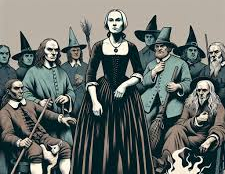
Throughout history, women who dared to challenge the status quo—whether through knowledge, independence, or activism—were met with suspicion, hostility, and even violence. The parallels between witches, suffragettes, and the feminine itself reveal a long-standing pattern of fear and repression. At the heart of this is the fear of female power.
The Witch Hunts: Fear of the Independent Woman
For centuries, women accused of witchcraft were often healers, midwives, or those who lived outside societal norms. They possessed knowledge—of herbs, childbirth, and nature—that threatened male-dominated institutions like the Church and medical profession. The witch hunts of the 15th to 18th centuries saw thousands of women executed under the guise of purging evil.
But the real crime of many so-called witches was independence. Widows, unmarried women, and those who lived without male control were often the first to be accused. These trials weren’t just about superstition; they were about reinforcing power structures and ensuring that women remained submissive.
The Suffragettes: Fear of the Political Woman
Fast forward to the late 19th and early 20th centuries, and another group of women was branded as dangerous: the suffragettes. These women fought for the right to vote, challenging the idea that women should remain politically passive.
Like the so-called witches before them, suffragettes were vilified. They were called hysterical, irrational, and destructive to the social order. Many were imprisoned, force-fed during hunger strikes, and physically assaulted. The violence they endured mirrored the persecution of witches centuries earlier—both groups faced brutal attempts to suppress their voices and power.
The Feminine as a Threat
At the core of both witch hunts and suffragette suppression is the broader fear of the feminine. In patriarchal societies, the feminine—intuition, emotion, connection to nature—has often been framed as chaotic or dangerous. Women who embodied these traits, or who wielded knowledge and influence, were seen as threats.
This fear continues today. Women who rise to power, challenge norms, or assert their autonomy are still labeled in ways meant to undermine them. Whether it’s calling strong women “bossy” or dismissing feminism as radical, the resistance to female empowerment persists.
Reclaiming Power
The good news? The witch, the suffragette, and the feminine itself are being reclaimed. The image of the witch has transformed into a symbol of feminine strength, wisdom, and connection to the earth. The suffragettes paved the way for women’s rights movements that continue to push for equality. And today, embracing the feminine—whether in leadership, activism, or everyday life—is an act of resistance.
Women throughout history have been feared not because they were weak, but because they were powerful. The time has come to embrace that power, to rewrite the narrative, and to continue the fight for equality—without fear.
Helping Executive Women Reduce Stress, Prevent Fatigue & Avoid Burnout
📩 Follow me for more insights or send me a message to connect!
